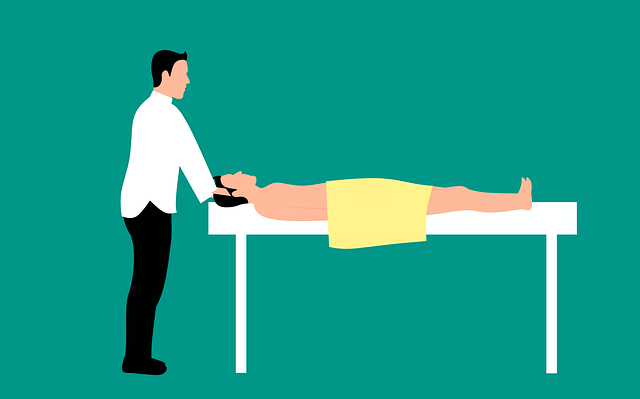Emotional regulation is a powerful technique for managing stress, forming the core of effective stress relief therapy. By recognizing and understanding emotional responses, individuals can employ tools like deep breathing, mindfulness, and cognitive reframing to regulate feelings and gain a calmer mindset. This process encourages thoughtful responses to stressors instead of impulsive reactions, improving mental health and well-being. Key steps include identifying triggers through journaling and practicing mindfulness, which helps break stress cycles and enhance emotional intelligence. Stress relief therapy also incorporates cognitive reframing to challenge negative thought patterns, replacing them with more balanced perspectives. Healthy coping mechanisms like exercise, balanced diet, and adequate sleep further support long-term stress management. Professional help, such as CBT and mindfulness-based interventions, provides tailored tools for effective stress navigation and improved quality of life.
Emotional regulation is a powerful tool in managing stress, enabling individuals to navigate life’s challenges with resilience. This article offers a comprehensive guide to achieving and maintaining inner calm. From understanding the basics of emotional control to exploring advanced techniques like mindfulness and cognitive reframing, we provide practical strategies for stress relief. Additionally, we discuss healthy coping mechanisms, lifestyle adjustments, and when to seek professional help through therapy, empowering readers to take charge of their mental well-being.
Understanding Emotional Regulation: The Foundation of Stress Relief

Emotional regulation is a vital tool for managing and mitigating stress, serving as the cornerstone of effective stress relief therapy. It involves recognizing, understanding, and effectively guiding our emotional responses to challenging situations. By adopting strategies to control and direct our emotions, we can navigate stressful circumstances with greater resilience and composure.
This process begins with awareness—identifying the presence of specific emotions and their triggers. Once recognized, individuals can employ various techniques to regulate these feelings, such as deep breathing exercises, mindfulness practices, or cognitive reframing. These strategies enable a shift in perspective, helping to calm and stabilize the mind and body. As a result, emotional regulation empowers individuals to respond to stressors thoughtfully rather than reacting impulsively, ultimately fostering better mental health and well-being.
Identifying Triggers: Recognizing Sources of Stress

Identifying triggers is a crucial step in navigating and managing stress effectively. Stress can stem from various sources, often unique to each individual. Recognizing these triggers is the first step towards achieving stress relief therapy. Common stressors include work pressures, financial concerns, personal relationships, health issues, or even certain environments and situations. By keeping a journal to track your feelings and the circumstances surrounding them, you can identify patterns and discover what specifically sets off your stress response.
For instance, some people find certain tasks or deadlines overwhelming, while others might be triggered by conflicts with colleagues or family members. Once these triggers are identified, individuals can proactively develop strategies to manage or avoid them, thereby reducing the frequency and intensity of stressful episodes. This self-awareness is a powerful tool in one’s arsenal for stress control.
Mindfulness Techniques for Calming the Mind and Body

Mindfulness has emerged as a powerful tool in the arsenal of emotional regulation strategies, offering effective stress relief therapy. By focusing on the present moment and cultivating non-judgmental awareness, individuals can calm both their minds and bodies. Simple mindfulness techniques like deep breathing exercises, meditation, and mindful walking can help to break the cycle of stressful thoughts and emotions.
These practices encourage a shift in perspective, allowing people to observe their feelings without reacting impulsively. Regular engagement with mindfulness practices can lead to enhanced emotional intelligence, better stress management, and improved overall well-being. Incorporating mindfulness into daily routines provides individuals with a valuable coping mechanism for navigating the challenges of modern life.
Cognitive Reframing: Changing Your Perspective on Stressors

Cognitive reframing is a powerful tool in the arsenal of emotional regulation strategies for managing stress and achieving stress relief therapy. It involves recognizing that our interpretations and perceptions of stressful situations are not always accurate or helpful, and learning to reframe or change these thoughts to reduce their negative impact. By challenging unhelpful thought patterns, individuals can gain a new perspective on stressors, transforming them from overwhelming challenges into manageable obstacles.
This process encourages people to look beyond the initial surface-level stressor and explore the underlying beliefs and assumptions that contribute to their emotional response. Once identified, these cognitive distortions can be replaced with more realistic and balanced thoughts, leading to reduced anxiety and improved coping mechanisms. Cognitive reframing, as a stress relief therapy technique, empowers individuals to take control of their emotional reactions and cultivate resilience in the face of stressful life events.
Healthy Coping Mechanisms: Building Resilience and Adaptability

Healthy coping mechanisms play a pivotal role in emotional regulation and stress control. Engaging in activities that promote relaxation, such as mindfulness practices or physical exercise, can significantly reduce stress levels and foster resilience. These strategies help individuals adapt to challenging situations, enabling them to manage their emotions effectively.
Building adaptability involves recognizing and embracing the ability to adjust one’s response to stressors. Through stress relief therapy and other evidence-based techniques, people can develop a toolkit of coping skills tailored to their unique needs. This enhances their overall well-being, allowing them to navigate life’s twists and turns with greater ease and composure.
Lifestyle Changes for Long-Term Stress Management

Emotional regulation is a key component of long-term stress management. Beyond short-term stress relief therapy, adopting sustainable lifestyle changes can profoundly impact overall well-being. Regular physical activity, for instance, not only boosts mood but also enhances resilience to stressful situations. A balanced diet supports brain health and energy levels, making it a crucial pillar in managing chronic stress. Adequate sleep is another often-overlooked aspect; prioritizing quality rest strengthens emotional regulation and improves coping mechanisms.
Additionally, cultivating mindfulness practices like meditation or yoga can help individuals develop a greater awareness of their emotions, enabling them to respond rather than react to stressful triggers. Social connections play a vital role too; building and maintaining strong relationships provides a support system that facilitates better stress management. These lifestyle adjustments work synergistically to create a robust framework for managing and reducing stress over the long term.
Exploring Professional Help: Therapy as a Tool for Stress Relief

Exploring Professional Help: Therapy as a Tool for Stress Relief
When it comes to managing chronic or overwhelming stress, turning to a mental health professional can be transformative. Stress relief therapy offers a safe and supportive space where individuals can learn effective coping strategies tailored to their unique needs. Through various therapeutic approaches, such as cognitive-behavioural therapy (CBT) or mindfulness-based interventions, individuals gain insights into their stress triggers and develop healthier ways of responding.
Therapy provides an opportunity for deep exploration and self-discovery. It equips people with practical tools to navigate stressful situations, improve emotional resilience, and enhance overall well-being. By addressing underlying issues and fostering better stress management skills, therapy can lead to lasting changes in one’s ability to cope, ultimately improving quality of life and promoting a sense of balance amidst life’s challenges.
